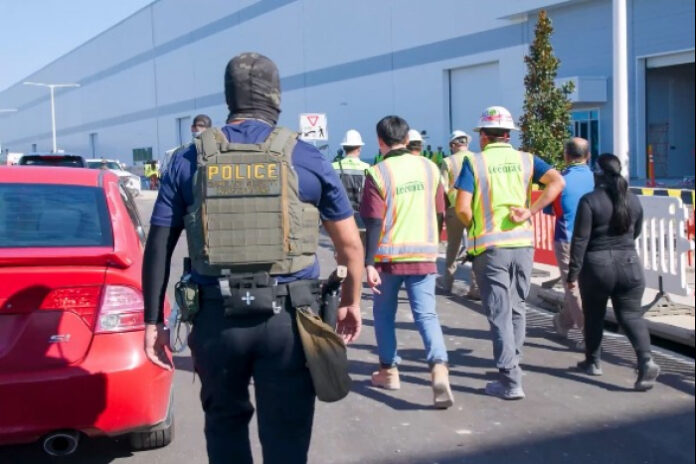The largest ICE operation since Trump’s return to power exposes the internal contradictions of the “America First” strategy. Between economic nationalism and anti-immigration zealotry, Washington sends conflicting signals to foreign investors—and is already paying the price for this strategic disarray.
A flagship plant turned into a target
On Thursday, September 4th, in the small Georgia town of Ellabell, the scene was more reminiscent of Cold War-era crackdowns than a modern industrial hub. In a massive ICE operation, 475 individuals—mostly South Koreans—were arrested at the sprawling Hyundai-LG site, an $8 billion joint venture that had until recently been praised by Donald Trump himself as a model of foreign investment under the “America First” agenda.
The Hyundai-LG raid lays bare the contradictions at the heart of Trump-era industrial policy. Can a country truly reindustrialize while treating foreign engineers and managers like potential threats? This wasn’t a case of undocumented migrants from border towns. These were skilled professionals sent to supervise a flagship EV battery and assembly plant, a cornerstone of the White House’s proclaimed economic revival.
“America First” as punishment politics
Until now, Trump’s key immigration advisor, the hardline Stephen Miller, had directed ICE toward symbolic targets: undocumented laborers, marginalized communities, the shadow economy. This time, however, the target was a critical foreign investment site, ironically, one previously used to promote Trump’s success in bringing manufacturing back to the U.S.
The militarized nature of the operation, and its timing, highlights a worrying shift. Hyundai, which was granted tariff exemptions in March precisely for its commitment to U.S. soil, now finds itself treated like a pariah. As Michael Plouffe of University College London puts it: “This kind of raid sends a clear signal: you can invest in the U.S., but you’ll never be fully welcome.”
Administrative hostility is becoming a hidden cost of doing business in America. In an increasingly competitive global market, that risk becomes a deterrent—especially when Mexico, Vietnam, or Eastern Europe offer cheaper, more stable alternatives.
Industrial strategy, sabotaged from within
The Hyundai-LG raid calls into question the long-term viability of “friendshoring”—a key tenet of the Trump strategy to re-shore industrial supply chains from strategic allies like South Korea. On paper, the idea was sound: bypass China, secure critical industries, and deepen ties with trusted partners. But how can you persuade Tokyo, Seoul, or Taipei to relocate key operations to the U.S. if their top executives are treated like criminals?
Sociologist Simon Bittmann of CNRS warns that such incidents will deter highly qualified workers from considering U.S. assignments. Add to this the visa restrictions, cuts to research, campus surveillance, and we’re left with a climate of fear—not opportunity.
Short-term, the U.S. will remain attractive due to its massive internal market and Trump’s protectionist tariffs. But long-term? Trust erodes, and companies will begin asking for more incentives to offset mounting political risks.
The hidden motivations behind the Hyundai-LG raid
So why risk undermining one’s own industrial strategy? The answer may lie less in geopolitics and more in electoral calculus. As reported by The Wall Street Journal, parts of rural Georgia had grown disillusioned with Hyundai-LG, complaining that job promises hadn’t been met and that too many positions went to Koreans, not locals.
The Hyundai-LG raid served dual purposes: send a message to Seoul, “we want your money, not your workers”—and pacify the MAGA base—”America is for Americans”. This economic populism fused with identity politics may energize voters, but it puts foreign capital on alert.
Even Trump ally Brian Kemp, Georgia’s governor, now finds himself in a bind. After offering over $2 billion in state subsidies to attract Hyundai and LG, he faces a scenario where ICE undermines those very investments.
Behind the rhetoric of sovereignty and economic revival lies a more chaotic reality: an America at war with itself. Strategic interests sacrificed on the altar of short-term political theatrics. In essence, Trump’s America fires on its own industrial allies at point-blank range.
Fortress America, strategically bankrupt?
The Hyundai-LG raid is not a bureaucratic misstep, it’s a revelation. It exposes the incoherence of current U.S. industrial and immigration policy. In seeking to expel all foreigners, even those who build, invest, and innovate, the U.S. is undermining its own economic future.
More than that, the raid signals a paradigm shift: America is no longer a reliable industrial partner. It has become a high-risk zone, where investments can be upended overnight by political spectacle. More raids will only deepen the confusion, not resolve it.



